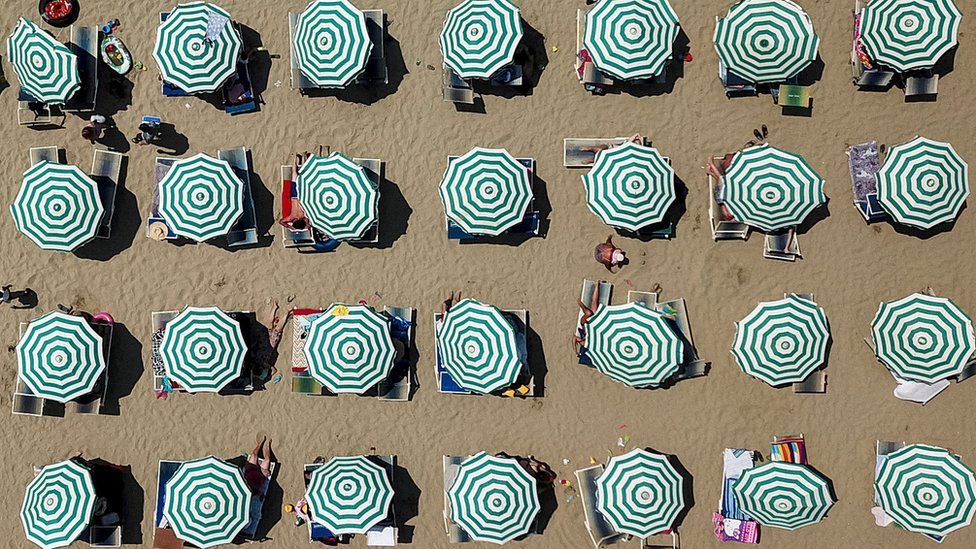Why August's 'silly season' is good for the soul
- Published

Around the world, the phrase "mind the gap" is regarded as a British curiosity.
Thousands of "hilarious" mind the gap T-shirts have been stuffed into holiday luggage since the practical health and safety warning was introduced on London Underground in the late '60s.
It has found its way into countless songs, movies, books and video games, as well as a library of worthy reports warning of the dangers of some scandalous inequality.
But I don't believe we should mind our gaps. I think we should embrace and celebrate them.
It is the interstitial spaces in our lives, the bits of nothing found between somethings, the pauses and moments of silence: these are vital, not just for our society, but our souls.
The month of August is often disparagingly described as "the silly season". To me, it is the season of common sense.
The rhythm of British life, shaped since the Middle Ages around the four terms of the legal and academic calendar, finds August marooned in the gap between Trinity and Michaelmas.
The senior courts, universities and Parliament are on vacation: the establishment removes its wig and gown and heads for the beach or the hills.
Journalists despair at the lack of proper news, by which they mean that the orchestra leading the Westminster political courtship dance has left its pit.
Without its urgent beat, the industry that lives to influence power itself powers down.
In August, stories which normally get lost below the fold, become headlines: provincial scandal and foreign tragedy, obscure gossip and quirky human interest. This is no bad thing.
Without the incessant and deafening clatter and clang of the domestic political machine, we have relative quiet. A gap in which we can ponder and muse. August is a time for contemplation.
We are told that members of Parliament are off recharging their batteries, flopping on to a sunbed with some fat tome that promises fresh understanding of the world.
The suggestion is that they will return renewed, fizzing with ideas. And, while it is easy to scoff, I want my political leaders to make time to unwind and to think.
We should all do it. But the August hiatus is not easy to navigate. No-one can relax if they feel guilty. My problem is that I tend to feel guilty when I relax.
The work ethic that shapes Northern European society nags many of us to fill our time only with purposeful activity.
It wags a disapproving finger at the idea of pleasure for pleasure's sake, tut-tutting at such self-indulgence. Doing nothing is immoral. To relax is to sin.
The tyranny of email is the work ethic in digital form. The constantly updating Twitter feed tells a beguiling tale of a world in full flow.
The smartphone throbs with things to be done and no time to waste. I dare not look away for fear of the "what-ifs". What if someone needs to get hold of me? What if I've left the gas on? What if something has happened?
As a journalist, that last "what-if?" has a particularly powerful grip, the terror of being out of the loop, unaware and ignorant. News is always urgent. I must be in touch. I dare not look away.
But the incessant hullabaloo drowns out the quiet voices of reflection and deliberation.
We are in danger of mistaking activity for understanding, of missing the bigger picture, of being blind to the world from a different angle.
That is why perhaps my favourite gap can be found on BBC Radio 4. It comes just before the news at 18:00. The chimes of Big Ben herald the bulletin, an announcer says "good evening", and then there is a moment of total silence before the stately bongs ring out.
Those few seconds of hush roar from my radio. They tell the world that what it is about to hear has not been hurried or rushed. What follows has been carefully considered, judged and evaluated.
These rare oases of calm are becoming more important, as the planet seems to spin ever faster.
Elsewhere on BBC Radio, Thought for the Day and Pause for Thought are familiar sanctuaries of reflection within febrile news or pounding pop.
Who and what fills these gaps in the schedule is the subject of debate, but the principle seems as important as ever.
The idea that best news is fast news is being challenged. The Guardian newspaper introduced its "long read" section in 2012: essays that require the reader to devote time to engaging with the content.
Other British and American newspapers have adopted the phrase. And the BBC says it will promote a "slow news" approach to various output.
People had assumed that the internet would kill long-form journalism, but the web, from The Atlantic and The Huffington Post to Buzzfeed and Wired, seems to be reviving it.
It is a reminder, perhaps, of how the new is so often met by an equal and opposite force. The more frantic and ephemeral the world appears, the greater the need and demand for composure and serenity.
The health and well-being benefits of mindfulness, deliberately stopping to pay attention to the present, are now so well documented that it is recommended by the NHS to treat chronic depression. We all need to do this stuff.
The quiet of August is not silly. It is essential.
- Published18 March 2016